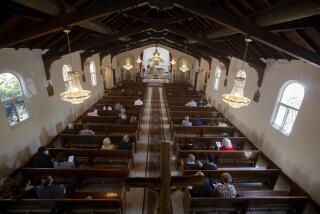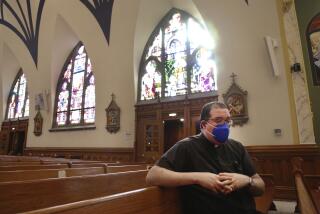Less Focus on Church, but More on God
As the nation settles into the year 2000 and fears of the apocalypse are temporarily put to rest, theologians and church leaders have begun asking a new question.
Where is religion headed in the 21st century?
If the most recently released polls on religious data are to be believed, faith may be finding a more convenient home outside the traditional walls of the church.
Church attendance is declining in the United States and many other industrialized nations, according to a University of Michigan international study on faith and values released this week. At the same time, however, in both the United States and elsewhere, the percentage of people who report that they think about spiritual issues is holding steady or is on the rise.
“Although church attendance is declining in nearly all advanced industrial societies, spiritual concerns more broadly defined are not,” said Ronald Inglehart, a political scientist at the University of Michigan’s Institute for Social Research who co-wrote the study with sociologist Wayne Baker.
“In fact, in most industrial societies, a growing share of the population is spending time thinking about the meaning and purpose of life.”
The study’s findings show that the percentage of Americans who reported attending worship services at least once a month dropped from 60% in 1981 to 55% in 1998. At the same time, half of those same Americans rated the importance of God as 10 on a 10-point scale.
The study, which is to be published in the February issue of the American Sociological Review, was conducted in 65 societies and compiled from interviews with 165,594 adults on their religious behavior and beliefs.
Polls consistently have reported higher church attendance in the United States than in other industrial democracies. The Michigan researchers discovered that of the 19 industrialized democracies surveyed, 15 showed declining rates of church attendance. Northern Ireland and Great Britain were the only Western European industrialized nations which showed modest increases.
Among ex-communist societies, the pattern in church attendance was markedly different. Five of the eight societies surveyed--Hungary, Bulgaria, Belarus, Latvia and Russia--showed increases in church attendance.
In developing and low-income nations, the results are mixed. Some countries, Argentina and Mexico, for example, showed drops in attendance; other nations, such as South Africa, showed increases.
To measure importance of religious beliefs, the institute asked people two questions: “How important is God in your life?” and “How often, if at all, do you think about the meaning and purpose of life?”
Importance of God remained relatively stable in industrialized nations and increased in all ex-communist societies except the former East Germany, and in most developing, low-income nations.
For the question on meaning and purpose of life, increases were most substantial in the advanced industrial democracies of Australia, West Germany, South Korea, Italy and the Netherlands. In the United States, 46% of Americans said that they thought about the meaning and purpose of life “often,” surpassed only by East Germany’s 47% and Argentina’s 51%.
Inglehart believes the findings show that while allegiance to religious institutions declines, spiritual concerns remain strong but are being displayed in different outlets away from church.
“The established churches today may be on the wrong wavelength for most people in postindustrial societies, but new theologies such as the theology of environmentalism, or New Age beliefs, are emerging to fill an expanding niche,” Inglehart said.
A Gallup poll released last month found that seven in 10 Americans believe a person can be religious without going to church.
Several theologians see a danger in this shift as religion moves from living church communities to isolated, spiritual individuals.
“From the Catholic point of view, this raises concerns because our theology is about being focused on God or Christ as he is present in others. Whereas, with spirituality, one can just focus on personal well-being,” said Father Allan Figueroa Deck, executive director of the Loyola Institute for Spirituality in Orange.
One of the characteristics of present-day religion is disenchantment with institutions, coupled with a rising trend in individualism, Deck noted. But he cautioned that polls about declining attendance should be analyzed carefully before making firm predictions.
Different ethnic groups, for example, may be behaving differently, with new immigrants attending church at a different rate than longer-established residents, he said.
“African Americans, for example, have always remained a profoundly religious people. Polls have consistently shown that have strong faith in God. But, how are they doing that? Is it going to church once a month or every week?” Deck asked.
Others, like San Francisco religion writers Don Lattin and Richard Cimino, see a move toward “cafeteria Christianity” gathering steam in the 21st century. The term encompasses a trend in which believers pick and choose what appeals to them in different denominations and faiths.
In their 1998 survey, “Shopping for Faith: American Religion in the New Millennium,” Lattin and Cimino write: “One way to understand American religion and chart its future is to see the world of faith like any other product or service in the U.S. economy.”
Still, Deck warned that it can be inaccurate to use polls of religious behavior as predictors for the future.
“This trend toward individualism could be a blurb on the screen, a passing phenomenon. The interest in religion on the Internet may be something that will stop growing in the years ahead. Let’s let the dust settle, then take an intelligent approach to what tomorrow holds,” he said.
(BEGIN TEXT OF INFOBOX / INFOGRAPHIC)
Changing Congregations
Church attendance among American adults has slipped, yet it remains higher than in other industrial democracies. Among ex-communist societies, most countries surveyed showed rising church attendance. Here are percentages of people who said they attend religious services at least once a month.
INDUSTRIALIZED DEMOCRACIES:
Australia
1981: 40
1995-98: 25
Finland
1981: 13
1995-98: 11
Former West Germany
1981: 35
1995-98: 25
South Korea
1981: 29
1995-98: 27
Japan
1981: 12
1995-98: 11
Spain
1981: 53
1995-98: 38
Sweden
1981: 14
1995-98: 11
United States
1981: 60
1995-98: 55
DEVELOPING AND LOW-INCOME COUNTRIES
Argentina
1981: 56
1995-98: 41
Mexico
1981: 74
1995-98: 65
South Africa
1981: 61
1995-98: 70
EX-COMMUNIST COUNTRIES
Belarus
1990-91: 6
1995-98: 14
Former East Germany
1990-91: 20
1995-98: 9
Latvia
1990-91: 9
1995-98: 16
Poland
1990-91: 85
1995-98: 74
Russia
1990-91: 6
1995-98: 8
Source: University of Michigan’s Institute for Social Research
More to Read
Sign up for Essential California
The most important California stories and recommendations in your inbox every morning.
You may occasionally receive promotional content from the Los Angeles Times.










